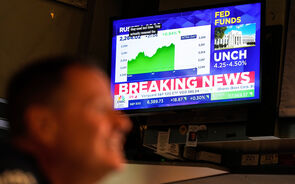Wall Street Sees Big Post-War Rally
1 Mensagem
|Página 1 de 1
Wall Street Sees Big Post-War Rally
Wall Street Sits Tight as War Looms
Experts See Relief Rally After Bombs Start to Fall
By Anitha Reddy
Washington Post Staff Writer
Thursday, February 13, 2003; Page E01
While political analysts and the news media debate how a war in Iraq might play out, many mutual fund managers, investment strategists and financial advisers have already come to the same conclusion: It will be short, and its effect on the market will be sweet.
Wall Street's consensus seems to be that the first bombs over Baghdad, or a coup, or Saddam Hussein's self-imposed exile -- or any scenario that could herald a resolution to the confrontation -- will set off a relief rally.
"The market will be queasy in the run-up to the event, but we need to be in a positive position to take advantage of the outcome," said Alfred Kugel, senior investment strategist at Stein Roe Investment Counsel LLC, a money-management firm in Chicago. "It could all happen pretty fast."
After a New Year's rally, the market has been paralyzed by the possibility of war in Iraq. The Dow Jones industrial average has fallen 12.3 percent since it peaked Jan. 14, and the Nasdaq composite index has fallen 12.5 percent over the same period.
With retail investors too scared to participate and institutional managers sitting tight until international tensions ease, the market's trading volume has been unusually light -- making it easier to push stock prices around and leading to heightened volatility, according to analysts.
But mutual fund managers and strategists say they have been trying to ignore the market fluctuations and have made only minimal changes, if any, to their asset selections. For instance, Stein Roe hasn't altered its investment strategy or sector weightings because of war talk, according to Kugel, because the shop is agreed that the war itself will probably be brief and successful.
Barring a terrorist attack or a market plunge, Paul Dietrich, chairman of Nye, Parnell & Emerson Capital Management Inc. in Alexandria, told his clients he would maintain most of their portfolios in stocks. "Only investors holding equities at the time will get the full benefit of a sharp market upswing," Dietrich wrote in his most recent investment newsletter.
Analysts, however, disagree on what will happen after the initial war rally.
Even short sellers, who often bet that stocks will go down, say that a pop in the market is likely when the bombs first start falling. "The first reason there will be a war rally is because everyone thinks so," said William A. Fleckenstein, president of Fleckenstein Capital, a short-selling hedge fund in Seattle.
"But the fact that so many people anticipate that means the rally will be less potent than if no one expected it," he added.
Predictions over what happens to the stock market next reflect the fund managers' views on the health of the economy. "We have not made a lot of changes over the short term," said John P. Calamos, chief executive of Calamos Investments, an institutional money manager and mutual fund company in Naperville, Ill. "We have not gone to cash. What we've done is really tried to look beyond that -- six months, 12 months, 18 months out. Is the economy improving? What are the earnings trends?"
Investors point out that during the January earnings season, many companies managed to meet analysts' expectations and post significantly improved profits over last year. Of course, those expectations had been progressively deflated near the end of the year, and better margins came from relentless penny pinching, not improved sales.
Still, many strategists believe war fears are artificially stalling the market and the economy and that both are healthier than they appear.
"A lot of the reason the equity market is being held down is uncertainty related to the war," said Heydon D. Traub, who is in charge of global asset-allocation strategy at State Street Global Advisors in Boston. "If war does begin, it won't be long before uncertainty lifts and people will begin to invest idle cash and companies improve capital spending," he said. Traub said the firm also feels no need to flee to traditional wartime sanctuaries, such as precious metals or cash.
"Our view is any engagement in Iraq will be short-lived and the economy will be better at the end of the year," said Kevin R. McCloskey, a value fund manager at Federated Investors in Pittsburgh.
Experts See Relief Rally After Bombs Start to Fall
By Anitha Reddy
Washington Post Staff Writer
Thursday, February 13, 2003; Page E01
While political analysts and the news media debate how a war in Iraq might play out, many mutual fund managers, investment strategists and financial advisers have already come to the same conclusion: It will be short, and its effect on the market will be sweet.
Wall Street's consensus seems to be that the first bombs over Baghdad, or a coup, or Saddam Hussein's self-imposed exile -- or any scenario that could herald a resolution to the confrontation -- will set off a relief rally.
"The market will be queasy in the run-up to the event, but we need to be in a positive position to take advantage of the outcome," said Alfred Kugel, senior investment strategist at Stein Roe Investment Counsel LLC, a money-management firm in Chicago. "It could all happen pretty fast."
After a New Year's rally, the market has been paralyzed by the possibility of war in Iraq. The Dow Jones industrial average has fallen 12.3 percent since it peaked Jan. 14, and the Nasdaq composite index has fallen 12.5 percent over the same period.
With retail investors too scared to participate and institutional managers sitting tight until international tensions ease, the market's trading volume has been unusually light -- making it easier to push stock prices around and leading to heightened volatility, according to analysts.
But mutual fund managers and strategists say they have been trying to ignore the market fluctuations and have made only minimal changes, if any, to their asset selections. For instance, Stein Roe hasn't altered its investment strategy or sector weightings because of war talk, according to Kugel, because the shop is agreed that the war itself will probably be brief and successful.
Barring a terrorist attack or a market plunge, Paul Dietrich, chairman of Nye, Parnell & Emerson Capital Management Inc. in Alexandria, told his clients he would maintain most of their portfolios in stocks. "Only investors holding equities at the time will get the full benefit of a sharp market upswing," Dietrich wrote in his most recent investment newsletter.
Analysts, however, disagree on what will happen after the initial war rally.
Even short sellers, who often bet that stocks will go down, say that a pop in the market is likely when the bombs first start falling. "The first reason there will be a war rally is because everyone thinks so," said William A. Fleckenstein, president of Fleckenstein Capital, a short-selling hedge fund in Seattle.
"But the fact that so many people anticipate that means the rally will be less potent than if no one expected it," he added.
Predictions over what happens to the stock market next reflect the fund managers' views on the health of the economy. "We have not made a lot of changes over the short term," said John P. Calamos, chief executive of Calamos Investments, an institutional money manager and mutual fund company in Naperville, Ill. "We have not gone to cash. What we've done is really tried to look beyond that -- six months, 12 months, 18 months out. Is the economy improving? What are the earnings trends?"
Investors point out that during the January earnings season, many companies managed to meet analysts' expectations and post significantly improved profits over last year. Of course, those expectations had been progressively deflated near the end of the year, and better margins came from relentless penny pinching, not improved sales.
Still, many strategists believe war fears are artificially stalling the market and the economy and that both are healthier than they appear.
"A lot of the reason the equity market is being held down is uncertainty related to the war," said Heydon D. Traub, who is in charge of global asset-allocation strategy at State Street Global Advisors in Boston. "If war does begin, it won't be long before uncertainty lifts and people will begin to invest idle cash and companies improve capital spending," he said. Traub said the firm also feels no need to flee to traditional wartime sanctuaries, such as precious metals or cash.
"Our view is any engagement in Iraq will be short-lived and the economy will be better at the end of the year," said Kevin R. McCloskey, a value fund manager at Federated Investors in Pittsburgh.
1 Mensagem
|Página 1 de 1
Quem está ligado:
Utilizadores a ver este Fórum: bigest, Bing [Bot], iniciado1, Lisboa_Casino, m-m, marcruz25.1945, navaldoc, Nuno V, PAULOJOAO, Pmart 1 e 83 visitantes


